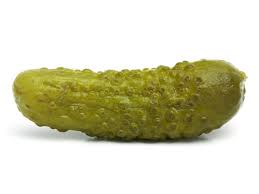记忆方法
将“pickle”分解为“pick”和“-le”。想象“pick”动作像小个子人(-le)在挑选或挑选出来一些东西,就像是在制作泡菜或酸菜,这种动作保留了食物,就像腌制品一样。通过这样的动作和形象化记忆,可以帮助记住“pickle”这个单词的含义。
以上内容由AI生成, 仅供参考和借鉴
中文词源
pickle 腌菜
来自荷兰语pekel,卤水,腌菜,最终词源不详,据说是来自中世纪发明这种腌菜的一个荷兰渔夫的名字。
英语词源
- pickle (n.)
- c. 1400, probably from Middle Dutch pekel "pickle, brine," or related words in Low German and East Frisian (Dutch pekel, East Frisian päkel, German pökel), of uncertain origin or original meaning. Klein suggests the name of a medieval Dutch fisherman who developed the process. Originally a sauce served with meat or fowl; meaning "cucumber preserved in pickle" first recorded 1707, via use of the word for the salty liquid in which meat, etc. was preserved (c. 1500). Figurative sense of "sorry plight" first recorded 1560s, from the time when the word still meant a sauce served on meat about to be eaten. Meaning "troublesome boy" is from 1788, perhaps from the notion of being "imbued" with roguery.
- pickle (v.)
- 1550s, from pickle (n.). Related: Pickled; pickling.
权威例句
- 1. Companies find themselves in a pickle when their markets change.
- 公司在市场发生变化时会发现自己身陷困境。
- 2. Mother used to pickle onions.
- 妈妈过去常腌制洋葱.
- 3. Select your favourite fruit or veg and pickle them while they are still fresh.
- 挑选最喜欢的水果或蔬菜,趁着新鲜把它们腌起来。
- 4. Caroline had sure as hell got herself into a pickle this time.
- 卡罗琳这次真是惹了大麻烦。
- 5. When there was nothing more to preserve, she began to pickle.
- 当没再有东西要保存时, 她就泡制酸菜.
